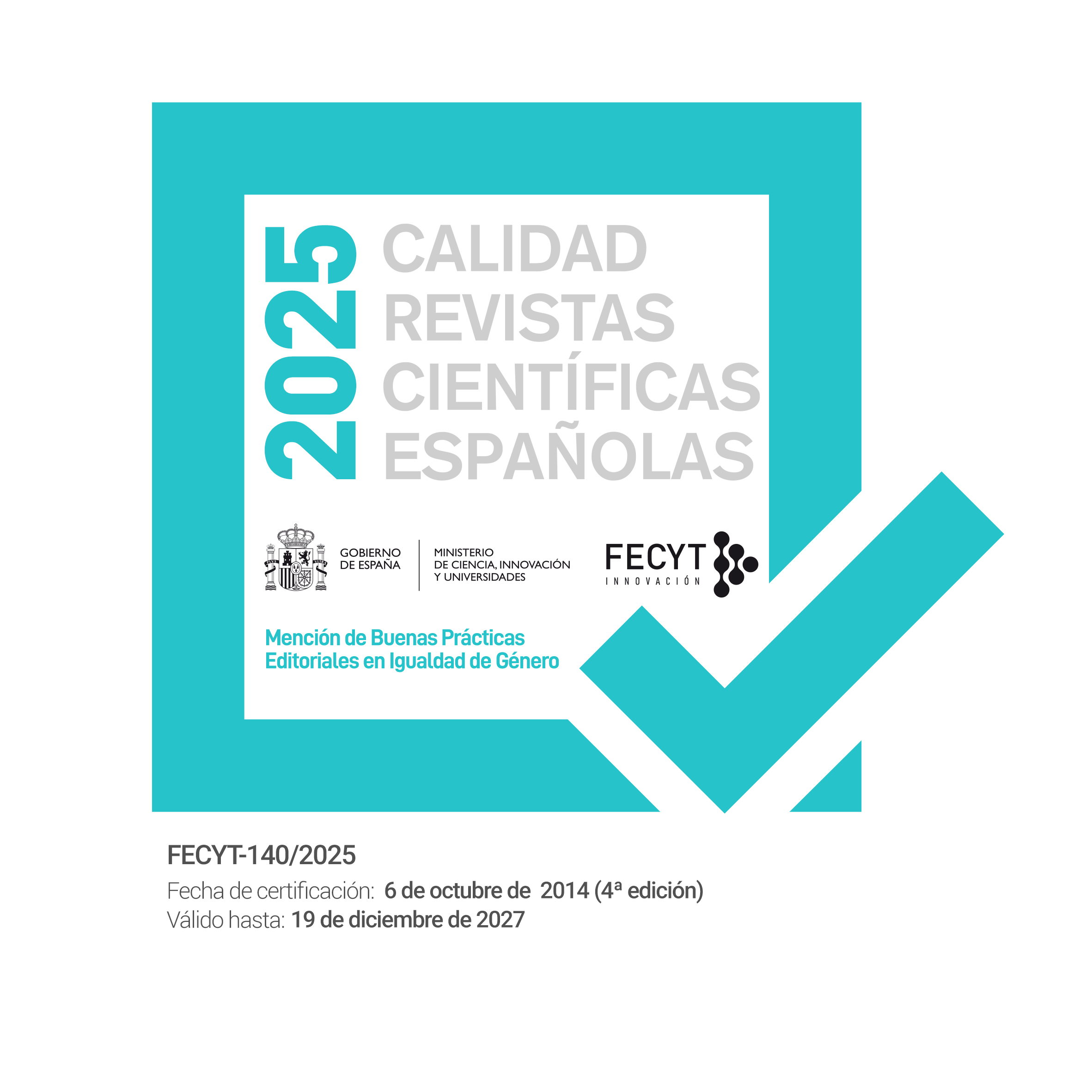On educators' methodological strategies to contribute to youth empowerment
DOI:
https://doi.org/10.5944/educxx1.30014Keywords:
youth, methodologies, youth empowerment, educatorsAbstract
If we start from the idea that educators are important agents in the youth empowerment process, this study aims to analyse the vision of education professionals on the use of certain methodologies and strategies which are useful and effective in the processes of youth empowerment. A quantitative analysis is carried out by means of a self-administered questionnaire, answered by a validated sample of 696 educators from five communities in Spain. This analysis makes it possible to describe and analyse educators’ methodological strategies in their contribution to youth empowerment processes and to determine how the use of these strategies relates to personal factors such as the size of the territory where they work, professional experience, specific youth training or the area of intervention in which they are located. All of the professionals agree on the importance of using active and participatory methodologies to promote and empower young people and declare that they are applied in a generalised way along with accompanying young people during the educational process. After this initial overview, the research allows us to identify important differences between the application of these methodologies in the rural and urban context (where they are applied more intensively) or depending on whether the educator has obtained specific training in youth; however, other personal variables such as professional experience or the age of the educator are not so explanatory in this analysis. Finally, the fields of professional practice allow us to associate certain methodological profiles.
Downloads
References
Bauman, Z. (2010). Mundo consumo. Paidós.
Belykh, A. (2018). Resiliencia e inteligencia emocional: conceptos complementarios para empoderar al estudiante. Revista Latinoamericana de Estudios Educativos, 48(1), 255-282.
Collura, J., Raffle, H., Collins, A., & Kennedy, H. (2019). Creating spaces for young people to collaborate to create community change: Ohio’s youth-led initiative. Health Education & Behavior, 46(1S) 44S–52S. https://doi.org/10.1177/1090198119853571
Council of Europe. (2015). Council of Europe Youth Work Portfolio. A tool for the assessment and development of youth work competence. Council of Europe.
Davidson, E., & Carlin, E. (2019). “Steeling” young people: Resilience and youth policy in Scotland. Social Policy and Society, 18(3), 479-489. https://doi.org/10.1017/S1474746419000095
Deutsch, N., Mauer, V., Johnson, H., Grabowska, A., & Arbeit, M. (2020). “[My counselor] knows stuff about me, but [my natural mentor] actually knows me”: Distinguishing characteristics of youth’s natural mentoring relationships. Children and Youth Services Review, 111 (104879). https://doi.org/10.1016/j.childyouth.2020.104879
Flores, A. (2015). Empowerment and civic surrogacy: Community workers’ perceptions of their own and their latino/a students’ civic potential. Anthropology & Education Quarterly, 46(4), 397–413. https://doi.org/10.1111/aeq.12118
Froufe, S. (1997). Los ámbitos de intervención en la Educación Social. Aula, 9, 179-200. https://revistas.usal.es/index.php/0214-3402/article/view/3491
Gómez, I. M., Lledó, A., Parandones, T. M., & Herrera, L. (2014). El empoderamiento como estrategia de éxito en la formación inicial del profesorado. International Journal of Developmental and Educational Psychology, 7(1), 151-160. https://doi.org/10.17060/ijodaep.2014.n1.v7.786
Gonçalves, M., & García, À. (2016). Education and struggles for recognition: the strategic role of empowerment. Revista Española de Pedagogía, 264, 283-296.
Goyette, M., Mann-Feder, V., Turcotte, D., & Grenier, S. (2016). Youth empowerment and engagement: an analysis of support practices in the youth protection system in Québec. Revista Española de Pedagogía, 74, 31-49.
Greene, S., Burke, K., & McKenna, M. K. (2018). A review of research connecting digital storytelling, photovoice, and civic engagement. Review of Educational Research, 88(6), 844-878. https://doi.org/10.3102/0034654318794134
Greeson, J., Treglia, D., Morones, S., Hopkins, M., & Mikell, D. (2020). Youth Matters: Philly (YMP): Development, usability, usefulness, & accessibility of a mobile web-based app for homeless and unstably housed youth. Children and Youth Services Review, 108(104586). https://doi.org/10.1016/j.childyouth.2019.104586
Hongyee, G. (2020). A comparative analysis of online, offline, and integrated counseling among hidden youth in Hong Kong. Children and Youth Services Review, 114, 105042. https://doi.org/10.1016/j.childyouth.2020.105042
Kirk, C. M., Lewis, R. K., Brown, L. K., Karibo, B., Scott, A., & Park, E. (2015). The Empowering Schools Project: Identifying the Classroom and School Characteristics That Lead to Student Empowerment. Youth & Society, 49(6), 827-847. https://doi.org/10.1177/0044118X14566118
Paños, J. (2017). Educación emprendedora y metodologías activas para su fomento. Revista Electrónica Interuniversitaria de Formación del Profesorado, 20(3), 33-48. https://doi.org/10.6018/reifop.20.3.272221
Peterson, N. A. (2014). Empowerment theory: clarifying the nature of higher-order multidimensional constructs. American journal of community psychology, 53(1-2), 96-108. https://doi.org/10.1007/s10464-013-9624-0
Prowell, A. N. (2019). Using post-structuralism to rethink risk and resilience: Recommendations for social work education, practice, and research. Social Work, 64(2), 123-130. https://doi.org/10.1093/sw/swz007
Rappaport, J. (1984). Studies in empowerment: Introduction to the Issue. Prevention in Human Services, 38(2-3), 1-7. https://doi.org/10.1300/J293v03n02_02
Rojas, L. (2014). Unstandardizing teaching: The classroom teacher as an institutional and empowerment agent for Latina/o youth's college access. Doctoral Dissertation, California State University.
Ruff, D., & Harrison, K. (2020). “Ask Me What I Want”: Community-based participatory research to explore transition-age foster Youth’s use of support services. Children and Youth Services Review, 108, 104608. https://doi.org/10.1016/j.childyouth.2019.104608
San Pedro, P. (2006). El Individuo como agente del cambio: El proceso de empoderamiento. FRIDE Desarrollo «En Perspectiva», 1, 1-8.
Soler, P., Trilla, J., Jiménez-Morales, M., & Úcar, X. (2017). La construcción de un modelo pedagógico del empoderamiento juvenil: espacios, momentos y procesos. Pedagogía Social. Revista Interuniversitaria, 30, 19-32. https://doi.org/10.7179/PSRI_2017.30.02
Sullivan, A., & Simonson, G. (2016). A systematic review of school-based social-emotional interventions for refugee and war-traumatized youth. Review of Educational Research, 86(2), 503-530. https://doi.org/10.3102/0034654315609419
Sumaryanta, Mardapi, D., Sugiman & Herawan, T. (2019). Community-based teacher training: Transformation of sustainable teacher empowerment strategy in Indonesia. Journal of Teacher Education for Sustinability, 21(1), 48-66. https://doi.org/10.2478/jtes-2019-0004
Sung, Y-T., Yang, J-M., & Lee, H-Y. (2017). The effects of mobile-computer-supported collaborative learning: Meta-analysis and critical synthesis. Review of Educational Research, 87(4), 768-805. https://doi.org/10.3102/0034654317704307
To, S.-M., Chun-Sing, J., Liu, X., Danielle, C., Junfei, H., & Man-yuk, A. (2020). Youth empowerment in the community and young people’s creative self-efficacy: The moderating role of youth-adult partnerships in youth service. Youth and Society, 53(6), 1021-1043. https://doi.org/10.1177/0044118X20930890
Úcar, X., Jiménez-Morales, M., Soler, P., & Trilla, J. (2016). Exploring the conceptualization and research of empowerment in the field of youth. International Journal of Adolescence and Youth, 22(4), 405-418. https://doi.org/10.1080/02673843.2016.1209120
Vázquez-Fernández, M. J. & Barrera-Algarín, E. (2016). The essential role of the social worker as an integration agent for the youth who face school failure. The British Journal of Social Work, 47(7), 1923-1939. https://doi.org/10.1093/bjsw/bcw137
Wagaman, A. M. (2016). Promoting empowerment among LGBTQ youth: A social justice youth development approach. Child and Adolescent Social Work Journal, 33, 395–405. https://doi.org/10.1007/s10560-016-0435-7
Young, P., Hong, R., & Choi, S. (2020). Validation of the Employment Hope Scale (EHS) among summer youth employment program participants. Children and Youth Services Review, 111, 104811. https://doi.org/10.1016/j.childyouth.2020.104811
Zimmerman, M. (2000). Empowerment theory: psychological, organizational and community levels of analysis. In J. Rappaport & E. Seidman (Eds.), Handbook of Community Psychology (pp. 43-63). Springer Science & Business Media.
Downloads
Published
How to Cite
Issue
Section
License
Copyright (c) 2021 Carme Trull-Oliva, Ángela Janer-Hidalgo, Laura Corbella Molina, Pere Soler-Masó, Juan González-Martínez

This work is licensed under a Creative Commons Attribution-NonCommercial 4.0 International License.
Educación XX1 is published under a Creative Commons Attribution-NonCommercial 4.0 (CC BY-NC 4.0)











